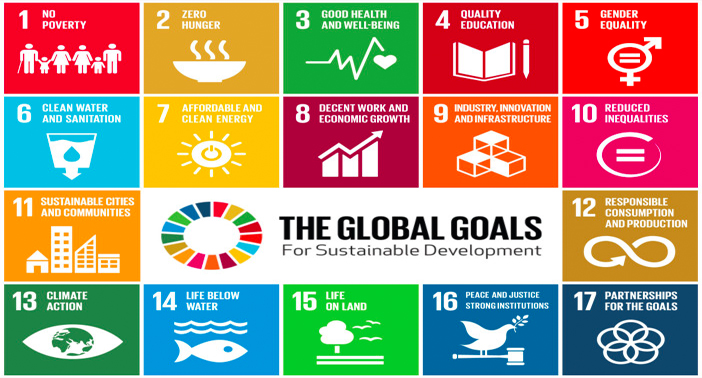What kind of world would you like to see in 2030? One without poverty? Or pollution? Or maybe one where everyone has access to a quality education?
In September of 2015, the United Nations decided what world they wanted to see, and crafted a bold set of 17 goals to help us achieve that vision. These Sustainable Development Goals (SDGs) tackled some of humanity’s most difficult problems, from climate change to inequality. Now, a year after their inception, the UN has released its inaugural review of the SDGs. Essentially the planet’s annual report card, the UN report on “Progress towards the Sustainable Development Goals” has reviewed the SDGs’ first year in effect and measures the world’s progress towards achieving them by the year 2030.
The world as it stands is a long way from solving all of its problems. 800 million people are suffering without adequate food and 2.4 million still live without access to improved sanitation. The issues are complex, and will take time to fully address. Since one year is not enough to truly evaluate our progress towards the SDG’s, the UN’s first report has examined trends over the last year and identified what challenges may exist in our pursuit of the goals. The result is an assessment of what we need in terms of action and resources in order to move closer toward that better world in 2030.
The work of the Jane Goodall Institute aligns closely with several of the goals, and we are invested in their long-term success. Below are just a few of the ways JGI is contributing to the accomplishment of the SDGs.
Education for All
SDG 4 focuses on ensuring quality education for all and supports the reduction of gender disparities in education. According to the report, in 2013 two thirds of the world’s adults who were unable to read or write were women, and 1 in 10 girls of primary school age were out of school. JGI has been working to reduce those disparities through their Girl’s Scholarship and Peer to Peer education programs. So far, JGI has provided scholarships to over 250 girls in Tanzania, and Peer to Peer education has been instrumental in providing girls in Uganda with reproductive education and hygiene kits that help keep them in school after puberty. Learn more here.
Gender Equality
JGI’s work in Uganda and Tanzania also aligns with SDG 5: achieving gender equality and empowering all women and girls. The SDG report states that women and girls make up the bulk of the unpaid labor force, spending more than twice the amount of time on domestic work as men. By ensuring women have an equal chance at education through scholarships, we are working improve their socio-economic prospects. Women who are educated about family planning and reproductive health are also more likely to have less children over the course of their lives and more time in between births, which will improve both their health and economic opportunities.
Clean Water
SDG 6 focuses on access to safe drinking water. Water is the most vital of resources for all life on Earth. In 2014 JGI helped install a new water piping system in the Democratic Republic of Congo. Our work through the TACARE program has also brought effective wastewater management systems to villages in Tanzania to help them ensure proper sanitation. A subgoal of SDG 6 is to protect and restore water-related ecosystems, which JGI is addressing through environmental education in the Lake Tanganyika ecosystem, aimed at reducing pressures on lake wildlife from local fishermen. Our forest conservation efforts are also helping achieve this goal, as wooded habitats play an important role in water filtration.
Sustainable Economic Growth
According to the SDG report, sustained and inclusive economic growth is crucial to achieving sustainable development, which is why SDG 8 promotes sustainable economic growth and employment for all. JGI recognizes that we can’t begin to improve the environment for chimpanzees, without first ensuring that local communities have access to sustainable livelihoods. This is the founding principle behind our community centered approach to conservation. One of our most successful programs has been the creation of woodlots and implementation of agroforestry in communities across central Africa. This provides a new source of revenue for villagers while reducing strain on the forests’ natural resources. JGI has also helped train communities in the practice of animal husbandry and beekeeping to increase economic opportunity.
Protecting Life on Land
SDG 15, to protect the forests and halt biodiversity loss, is at the core of JGI’s mission. According to the UN report, net forest loss between 2000 and 2015 was estimated at 3.3 million hectares per year and 23,000 species worldwide are facing extinction. The forests that make up core chimpanzee habitat are under threat from conversion to agricultural land and deforestation due to logging and mining. In order to save the chimpanzee, and countless other species native to these precious forests, JGI is combatting forest loss through our participatory land use plans and agroforestry programs. Land use plans allow villagers to map out what portions of their land will be used for various purposes and which will remain forest reserves. The woodlots provide a source of food, firewood and income without necessitating the clearcutting of surrounding forests. By involving communities in protecting their own natural resources, we are ensuring a future for people, the forests and the chimps.
So, as we progress towards these global goals in the coming years, JGI will be doing our part to make the world a better place for people, animals and the environment all over the planet.



